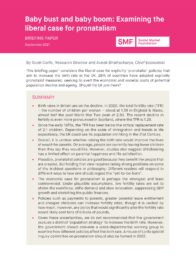This briefing paper considers the liberal case for explicitly ‘pronatalist’ policies that aim to increase the birth rate in the UK. 28% of countries have adopted explicitly pronatalist measures, seeking to avert the economic and societal costs of potential population decline and ageing. Should the UK join them?
- Birth rates in Britain are on the decline. In 2020, the total fertility rate (TFR) – the number of children per woman – stood at 1.58 in England & Wales, almost half the post-World War Two peak of 2.93. The recent decline in fertility is even more pronounced in Scotland, where the TFR is 1.29.
- Since the early 1970s, the TFR has been below the critical replacement rate of 2.1 children. Depending on the scale of immigration and trends in life expectancy, the UK could see its population shrinking in the 21st Century.
- Overall, it is unclear whether raising the birth rate would improve the lives of would-be parents. On average, people are currently having fewer children than they say they would like. However, studies also suggest childbearing has a limited effect on parental happiness and life satisfaction.
- Plausibly, pronatalist policies are good because they benefit the people that are created. But holding that view requires taking strong positions on some of the trickiest questions in philosophy. Different readers will respond in different ways to how one should regard the “yet-to-be-born”.
- The economic case for pronatalism is perhaps the strongest and least controversial. Under plausible assumptions, low fertility rates are set to shrink the workforce, stifle demand and slow innovation, suppressing GDP growth and stretching the public finances.
- Policies such as payments to parents, greater parental leave entitlement and cheaper childcare can increase fertility rates, though it is unclear by how much. However, any policy that would significantly alter the fertility rate would likely cost tens of billions of pounds.
- Given these uncertainties, we do not recommended that the government pursues a distinct ‘population strategy’ to increase the birth rate. However, the government should convene a cross-departmental working group to examine how different policies affect the birth rate. A House of Lords special inquiry committee on pronatalism should also be formed in 2022.

DOWNLOAD THE REPORT: PDF
